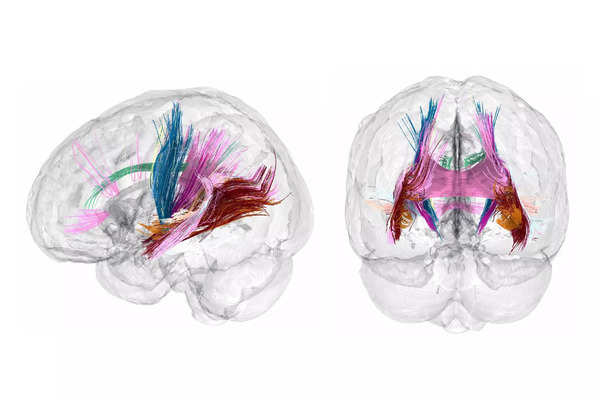Effects of pregnancy on the brain
A recent study “Neuroanatomical changes observed over the course of a human pregnancy” that was led by neuroscientists at the University of California has mapped how a woman’s brain reorganises in response to pregnancy. The researchers used advanced brain scans to track these changes in a first-time mother over the course of three years—starting just before conception, through pregnancy, and two years postpartum.
The study found a decrease in grey matter—the brain’s outermost layer that has the role of muscle control and sensory perception—and an increase in white matter integrity. This means that while some regions of the brain shrank slightly, others strengthened their connections. These changes seem tied to rising levels of pregnancy hormones like estradiol and progesterone.
In this photo provided by Liz Chrastil, a neuroscientist with the University of California, Irvine, she her holds her newborn son in May 2020. (Courtesy Liz Chrastil via AP)
How do the changes in grey matter affect the person?
The reduction in grey matter volume may sound concerning, but scientists suggest that this could actually reflect the ‘fine-tuning’ of the brain circuits, rather than any negative impact. Similar changes happen during puberty when the brain becomes more specialised. Pregnancy appears to stimulate a similar “reshaping” process, allowing the brain to adapt to the unique demands of motherhood.
A slight increase in grey matter volume postpartum was noted, though it didn’t return to pre-pregnancy levels. Researchers believe this change could be essential in helping mothers form strong emotional bonds with their newborns and become more attuned to their baby’s needs.

Brain scans of a woman during pregnancy provided by Daniela Cossio show that some areas shrink, possibly becoming more specialized, while neurological fibers appear to show temporarily improved communication. (Daniela Cossio via The New York Times) — NO SALES; FOR EDITORIAL USE ONLY WITH NYT STORY SLUGGED PREGNANCY BRAIN BY PAM BELLUCK FOR SEPT. 16, 2024. ALL OTHER USE PROHIBITED. —
What is the role of changed white matter?
Another finding from the study was the increase in white matter microstructural integrity. The lengthy nerve fibers that connect various brain regions make up the white matter. It facilitates the flow of information across the brain. The results of the study demonstrated that during pregnancy, especially in the later stages, these linkages improved.
This boost in white matter was highest around the second and third trimesters and slowly returned to normal after childbirth. Researchers think this could be a response to the brain’s need to manage the overwhelming physical and emotional changes that occur during pregnancy.
7 Daily habits to follow every night for a sharper brain
What is the “mommy brain” phenomenon?
We often hear about “mommy brain,” a term used to describe the forgetfulness and mental fog some women report during pregnancy. While the study’s lead subject, Elizabeth Chrastil, a neuroscientist herself, didn’t experience this, the research suggests that these changes are real, even if they don’t always manifest in obvious ways.
What’s notable is that even though the brain changes significantly, it doesn’t necessarily feel different to the person experiencing it. Chrastil remarked, “I didn’t feel any different during the study,” highlighting how subtle these shifts can be.
What are the other changes that happen after pregnancy?
The effects of pregnancy extend far beyond the brain. The body changes in response to the growing baby, including changes in hormones, the heart, and the lungs. Following childbirth, mood, metabolism, and even sleep patterns may vary for new moms. The “love hormone,” oxytocin, floods the body with hormones that start to build a link with the infant and promote emotional health.
These adjustments may cause difficulties for certain women, such as postpartum depression. The researchers hope that one day, their continued work will help forecast how these changes in the brain could flag risks for illnesses like preeclampsia or even postpartum depression
